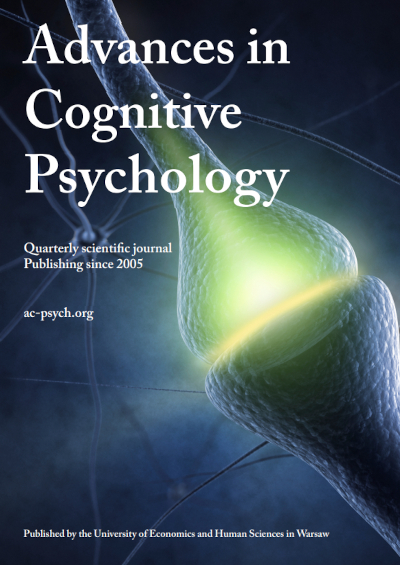Archive of all online content
-
Volume 22 Issue 1
pp. 1-41
()
-
Volume 21 Issue 4
pp. 309-500
(16 November 2025) -
Volume 21 Issue 3
pp. 212-308
(2 September 2025) -
Volume 21 Issue 2
pp. 120-211
(25 May 2025) -
Volume 21 Issue 1
pp. 1-93
(11 March 2025)
-
Volume 20 Issue 4
pp. 237-388
(20 November 2024) -
Volume 20 Issue 3
pp. 158-236
(19 August 2024) -
Volume 20 Issue 2
pp. 80-157
(24 June 2024) -
Volume 20 Issue 1
pp. 1-79
(1 March 2024)
-
Volume 19 Issue 4
pp. 1-105
(27 December 2023) -
Volume 19 Issue 3
pp. 211-333
(25 July 2023) -
Volume 19 Issue 2
pp. 111-200
(30 June 2023) -
Volume 19 Issue 1
pp. 1-110
(31 March 2023)
-
Volume 18 Issue 4
pp. 243-303
(31 December 2022) -
Volume 18 Issue 3
pp. 165-202
(30 September 2022) -
Volume 18 Issue 2
pp. 85-164
(30 June 2022) -
Volume 18 Issue 1
pp. 1-84
(31 March 2022)
-
Volume 17 Issue 4
pp. 250-291
(31 December 2021) -
Volume 17 Issue 3
pp. 193-249
(30 September 2021) -
Volume 17 Issue 2
pp. 99-192
(30 June 2021) -
Volume 17 Issue 1
pp. 1-98
(31 March 2021)
-
Volume 16 Issue 4
pp. 291-369
(31 December 2020) -
Volume 16 Issue 3
pp. 176-290
(30 September 2020) -
Volume 16 Issue 2
pp. 85-175
(30 June 2020) -
Volume 16 Issue 1
pp. 1-84
(31 March 2020)
-
Volume 15 Issue 4
pp. 236-317
(31 December 2019) -
Volume 15 Issue 3
pp. 169-235
(30 September 2019) -
Volume 15 Issue 2
pp. 75-168
(30 June 2019) -
Volume 15 Issue 1
pp. 1-74
(31 March 2019)
-
Volume 14 Issue 4
pp. 150-208
(31 December 2018) -
Volume 14 Issue 3
pp. 62-150
(30 September 2018) -
Volume 14 Issue 2
pp. 38-61
(30 June 2018) -
Volume 14 Issue 1
pp. 1-37
(31 March 2018)
-
Volume 13 Issue 4
pp. 267-322
(31 December 2017) -
Volume 13 Issue 3
pp. 190-266
(30 September 2017) -
Volume 13 Issue 2
pp. 121-189
(30 June 2017) -
Volume 13 Issue 1
pp. 1-120
(31 March 2017)
-
Volume 12 Issue 4 (special issue)
pp. 150-235
(31 December 2016) -
Volume 12 Issue 3
pp. 130-149
(30 September 2016) -
Volume 12 Issue 2
pp. 67-129
(30 June 2016) -
Volume 12 Issue 1
pp. 1-66
(31 March 2016)
-
Volume 11 Issue 4
pp. 118-135
(31 December 2015) -
Volume 11 Issue 3
pp. 64-117
(30 September 2015) -
Volume 11 Issue 2
pp. 31-63
(30 June 2015) -
Volume 11 Issue 1
pp. 1-30
(31 March 2015)
-
Volume 10 Issue 4
pp. 119-155
(31 December 2014) -
Volume 10 Issue 3
pp. 81-118
(30 September 2014) -
Volume 10 Issue 2
pp. 32-80
(30 June 2014) -
Volume 10 Issue 1
pp. 1-31
(27 February 2014)
-
Volume 9 Issue 4
pp. 156-223
(31 December 2013) -
Volume 9 Issue 3
pp. 112-155
(24 October 2013) -
Volume 9 Issue 2
pp. 53-111
(30 June 2013) -
Volume 9 Issue 1
pp. 1-52
(31 March 2013)
-
Volume 8 Issue 4
pp. 267-295
(31 December 2012) -
Volume 8 Issue 3
pp. 210-266
(27 September 2012) -
Volume 8 Issue 2
pp. 70-209
(28 June 2012) -
Volume 8 Issue 1
pp. 1-69
(29 March 2012)
-
Volume 7 Issue 2
pp. 55-156
(31 December 2011) -
Volume 7 Issue 1
pp. 1-54
(31 March 2011)
-
Volume 6 Issue 6
pp. 1-141
(31 December 2010)
-
Volume 5 Issue 5
pp. 1-134
(31 December 2009)
-
Volume 4 Issue 1
pp. 1-14
(31 March 2008)
-
Volume 3 Issue 4
pp. 419-465
(31 December 2007) -
Volume 3 Issue 3
pp. 363-417
(30 September 2007) -
Volume 3 Issue 1
pp. 1-361
(31 March 2007)
-
Volume 2 Issue 4
pp. 239-276
(31 December 2006) -
Volume 2 Issue 2
pp. 99-237
(30 June 2006) -
Volume 2 Issue 1
pp. 1-97
(31 March 2006)
-
Volume 1 Issue 1
pp. 1-16
()
Volume 14 Issue 2 (2018)
Letter from the Editors
Konrad Janowski, Rob H. J. van der Lubbe, Ulrich Ansorge
In this second newsletter of 2018, we wanted to inform you about some major changes in the editorial board of our journal.
Poking Left To Be Right? A Model-Based Analysis of Temporal Order Judged by Mice
Jan Tünnermann, Ingrid Scharlau

Jan Tünnermann, Cognitive Psychology, Paderborn University, Germany.
Email: jan.tuennermann@uni-paderborn.de
The theory of visual attention (TVA) provides a formal framework for the assessment of visual attention and related processes. Its center is a mathematical model of visual encoding processes and discretely defined components of attention. Building on this model, TVA offers quantitative and process-related explanations for a variety of phenomena in the domain of visual attention. Because the theory relies on very general assumptions which might hold true for other domains of sensory processing, we tested its possible explanatory value for tactile processing in mice. Reanalyzing published data of temporal-order judgments by mice, we show how a TVA-based analysis identifies the processes which drive observable behavior and that it comes to conclusions quite different from those of conventional analyses of temporal-order judgments. According to this analysis, despite the same overall capacity dedicated to the task, some mice assume attentional biases toward one side, possibly to optimize their overall performance. We suggest that TVA's concepts provide a powerful point of vantage to find explanations for observable behavior where conventional analysis easily leads to dead ends.
Age and Sex Differences in Verbal and Visuospatial Abilities
Efrat Barel, Orna Tzischinsky

Efrat Barel, Department of Behavioral Sciences, The Max Stern Academic College of Emek Yezreel, Emek Yezreel, Israel.
E-mail: efratb@yvc.ac.il
In order to explore the developmental patterns of sex differences in verbal and visuospatial abilities, the present study investigated sex differences in various cognitive abilities among children and adults. Three hundred and twenty-six children and adults completed a battery of six cognitive tasks testing two sets of abilities: The verbal cognitive battery tested verbal fluency and short-term memory tasks. The visuospatial battery tested mental rotation, localization, and form-completion tasks. Results showed a significant Sex × Age interaction on the mental rotation task, with men outperforming women in the 3D task, but with no sex differences shown in childhood in the 2D task. Sex differences in verbal fluency were found, with girls and women outperforming boys and men in this task. Findings are discussed within an integrative approach of biological as well as environmental factors.



